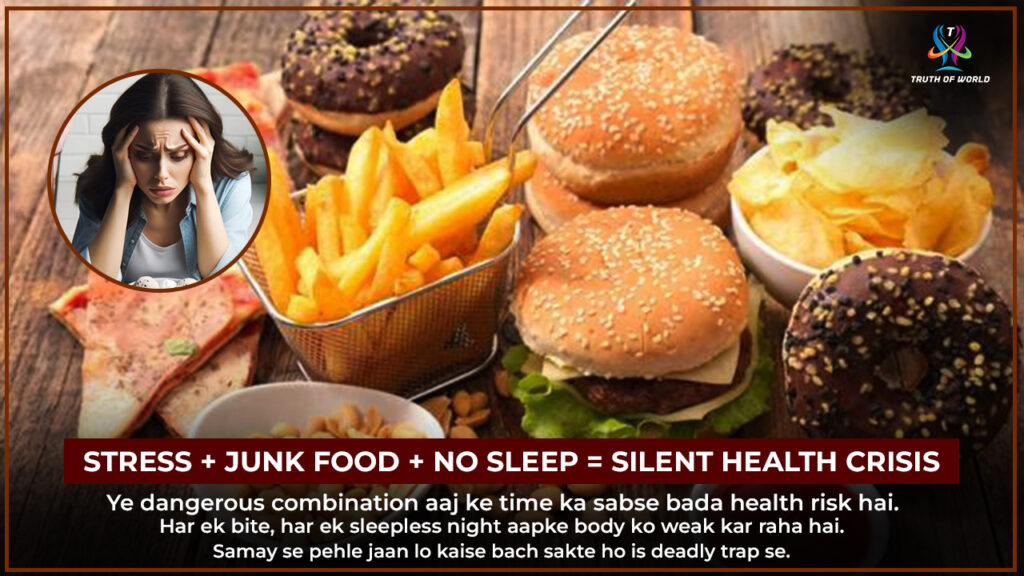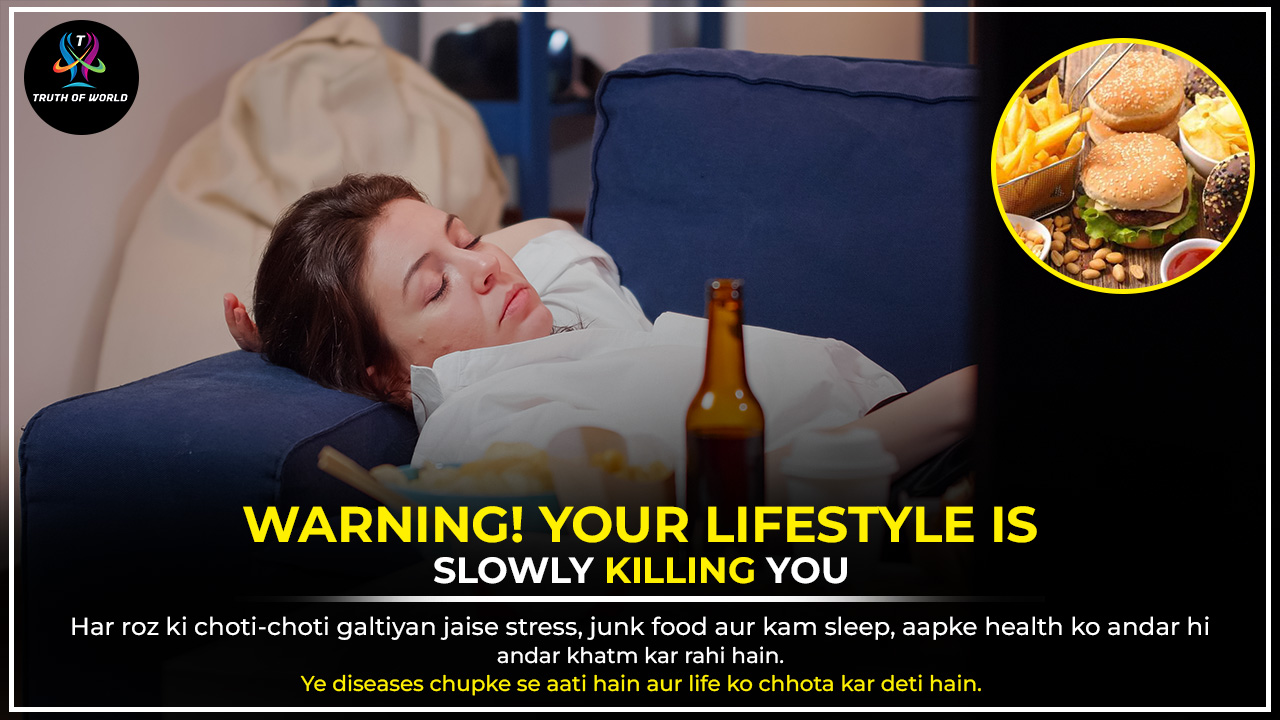Introduction
In the modern world, health is silently under attack. Unlike past centuries where infectious diseases such as plague or cholera were the biggest killers, today we are facing a new enemy: lifestyle diseases. These are not spread by germs or bacteria, but by our own habits — stress, unhealthy eating, lack of sleep, and physical inactivity.
Diseases like diabetes, hypertension, heart disease, obesity, and even mental health disorders are growing at an alarming rate. Doctors often call them the “silent killers” because they develop slowly, without warning, and then strike suddenly.
In this article, we will explore how our lifestyle choices are fueling this health crisis, why it affects millions worldwide, and what we can do to protect ourselves.
What Are Lifestyle Diseases?
Lifestyle diseases are health conditions caused primarily by daily habits such as poor diet, lack of exercise, stress, and inadequate sleep. Unlike infectious diseases, they are not contagious — but they are spreading faster than ever due to modern lifestyles.
Common Lifestyle Diseases:
- Diabetes (Type 2) – Caused by poor diet, obesity, and lack of exercise.
- Hypertension (High Blood Pressure) – Strongly linked to stress and junk food.
- Cardiovascular Diseases – Heart attacks, strokes, and artery blockages.
- Obesity – Resulting from unhealthy eating and sedentary lifestyle.
- Mental Health Disorders – Anxiety, depression, and chronic stress.
These conditions now account for 60–70% of deaths worldwide, according to WHO.

How Stress is Slowly Killing Us
Stress has become a daily companion in modern life. Long working hours, financial pressure, social media comparisons, and relationship issues create a never-ending cycle of anxiety.
- Cortisol overload: When stress hormones remain high for too long, they damage the heart and weaken immunity.
- Silent symptoms: Headaches, fatigue, irritability, and insomnia often go unnoticed until they develop into bigger health problems.
- Impact on mental health: Chronic stress is one of the leading causes of depression and anxiety worldwide.
👉 Stress doesn’t just affect the mind; it damages the body too.
Junk Food: The Delicious Poison
We live in the era of fast food, processed snacks, and sugary drinks. While they are convenient and tasty, they are slowly poisoning our bodies.
- High sugar and fat: Leads to obesity, diabetes, and fatty liver disease.
- Excess salt: Triggers hypertension and kidney problems.
- Additives and preservatives: Linked to cancer and digestive issues.
- Mindless eating: Social media and busy schedules make us eat without awareness, leading to overeating.
According to studies, regular consumption of junk food reduces life expectancy and increases the risk of early heart attacks.
Lack of Sleep: The Hidden Culprit
Many people underestimate the power of sleep. In reality, sleep is as important as food and water. Yet, due to late-night work, binge-watching, and mobile addiction, millions of people sleep less than 6 hours daily.
- Weakened immunity: Makes us more prone to infections.
- Poor brain function: Reduces concentration, creativity, and memory.
- Metabolic slowdown: Leads to weight gain and insulin resistance.
- Emotional imbalance: Increases risk of depression and anxiety.
Doctors recommend at least 7–8 hours of quality sleep for a healthy life.

The Global Rise of Lifestyle Diseases
Lifestyle diseases are no longer limited to rich countries. They are spreading rapidly across developing nations like India, Brazil, and parts of Africa.
- Urbanization: People moving to cities adopt unhealthy food habits.
- Work culture: Desk jobs and long hours mean less physical activity.
- Technology dependence: Excess screen time harms both body and mind.
According to the World Health Organization, by 2030, lifestyle diseases will be the biggest cause of death globally.
How Lifestyle Diseases Affect Daily Life
These conditions don’t just reduce lifespan, they also lower the quality of life:
- Difficulty in doing basic activities.
- High medical bills and long treatments.
- Emotional stress on families.
- Early retirement or job loss due to poor health.

Prevention: The Power of Small Changes
The good news is — lifestyle diseases are largely preventable. By making small but consistent changes, we can protect our health.
1. Healthy Eating
- Include fruits, vegetables, whole grains, nuts, and lean proteins.
- Limit processed food, sugar, and fried snacks.
- Drink enough water daily.
2. Regular Exercise
- At least 30 minutes of physical activity daily.
- Walking, yoga, cycling, or gym workouts.
- Avoid sitting for long hours.
3. Stress Management
- Practice meditation and deep breathing.
- Reduce overthinking and social media usage.
- Take short breaks during work.
4. Proper Sleep
- Maintain a regular sleep schedule.
- Avoid mobile phones before bedtime.
- Create a calm sleeping environment.
5. Regular Health Checkups
- Monitor blood pressure, sugar levels, and cholesterol.
- Early detection saves lives.
Mental Health: The Ignored Side of Lifestyle Diseases
Physical illnesses often get attention, but mental health struggles remain hidden. Anxiety, depression, and burnout are now considered lifestyle diseases too.
- Workplace burnout is rising in young professionals.
- Teenagers face mental pressure due to academics and social media.
- Elderly people suffer from loneliness and depression.
Taking therapy, talking to loved ones, and practicing mindfulness can make a big difference.
Technology and Lifestyle Diseases
Technology is both a blessing and a curse. On one hand, it has made life easier, but on the other, it has increased health risks:
- Sitting for hours in front of computers.
- Blue light from screens disturbing sleep.
- Addiction to social media affecting mental health.
Balanced use of technology is the key to preventing damage.
Case Studies and Real-Life Stories
- A 35-year-old IT professional suffered a heart attack due to long working hours and lack of exercise.
- A teenager developed obesity and diabetes from excessive junk food and soda.
- A young mother faced depression due to lack of sleep and stress from balancing work and family.
These stories show how lifestyle diseases can affect anyone, regardless of age.
Future of Health: Can We Win This Battle?
If we don’t act now, lifestyle diseases will continue to rise. But with awareness, education, and conscious choices, we can reverse the trend.
Governments, schools, and workplaces must also promote:
- Health education programs.
- Fitness-friendly environments.
- Campaigns against junk food marketing.
Lifestyle diseases are a silent epidemic. Unlike sudden infections, they creep into our lives quietly and destroy health over time. Stress, junk food, and lack of sleep may seem like small issues, but together they create a dangerous combination.
The solution lies in awareness and small daily habits. Choosing a salad over a burger, walking instead of scrolling, sleeping early instead of binge-watching — these little changes protect us from big health problems.
Our health is truly in our hands. Let’s not wait for a crisis; let’s act today.
About the Author
Hi, I’m Ronak Sharma — a passionate content creator and blogger who loves exploring topics that truly impact our daily lives.




